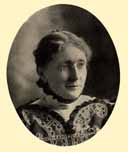

 |
 |
 |
|
|
|
Frances Elizabeth Willard was born September 28, 1839, in Churchville, New York. Her parents were Josiah Flint Willard and Mrs. Mary Thompson Hill Willard. Her brother, Oliver, was five years her senior. |
||
|
In 1842 they removed to Oberlin where her sister, Mary was born. In April, 1846, the family started for the West, reaching Janesville May 20th and settling in June at Forest Home, four miles from Janesville. |
 Forest Home |
|
 Milwaukee Female College 1852 |
In 1848 Mr. Willard was a member of the legislature at Madison. The mother taught the children in the bright warm kitchen by the light of the candles she made with her own hands. In 1853 a school house was built. There the children went to school until in 1857, Frances and Mary attended the Milwaukee Seminary where Mrs. Willard's sister, Sarah Hill, was teacher. In 1858, Frances and Mary attended the Evanston College for ladies. Frances taught the home school during the summer. The two sisters returned to the Evanston school in 1859. Frances so overburdened herself with study at this time that she fell asleep with her head buried in Butler's "Analogy." She was appointed valedictorian of her class. Because of her illness, she received her diploma in bed. In the autumn the family removed to Evanston. After her graduation Frances taught continuously until 1868. This year she and her friend, Miss Kate Jackson made an extended tour of the world. Miss Willard climbed the Pyramids of Egypt, and far above the others on an eminence she said: "Let us have plain living and high thinking." Returning to Evanston in 1870 she became Preceptress of her Alma Mater. In 1873 she became the Dean of Women of the Woman's College of Northwestern University and Professor of Aesthetics in the College of Liberal Arts. At the same time, the writer entered Northwestern University as a student and was thus privileged to be under her tutelage that year. Always a leader, when a child at play or young miss at school; as a teacher she was queen of her domain. Her language was as flowers; her presence, magnetic and sympathetic. She entertained us with picturesque humor. Francis Murphy, a contemporary said of her: "Frances Willard is the fairest rose in the garden." She was democratic. She deplored snobbishness. She retired from the university at the close of the school year. When we expressed our regret that she had left us she replied, "I am only in a larger school of girls." There could be no bounds set for her that had such inimitable mental power, such unwavering purpose. Her amiability, her originality, her talent for organization, and her silver-tongued oratory rendered her a leader and won for her sincere devotion. |
|
 Frances Willard Day |
Offered the principalship of a fashionable school for women and the presidency of the Chicago W. C. T. U., she chose the thorny path of the reformer and, renouncing beauty that she loved, she assumed the leadership of the women of America in the temperance crusade by accepting the presidency of the Chicago W. C. T. U. in March, 1874. The torch of duty always flamed aloft before her, luring her on to accomplish great things for moral uplift. October, 1874 she became corresponding secretary of the Illinois W. C. T. U. and president of the National Union in 1879. From 1874 she traveled ceaselessly, recrossing the Atlantic many times, pausing only for brief intervals of rest at the home of her co-worker, Lady Somerset, of England, or at her own "Rest Cottage" in Evanston. After repeated efforts, her dream at last came true when she organized the World's W. C. T. U. in 1883. She was made its President. Miss Anna Gordon, now president of the World's W. C. T. U. was for twenty-two years her constant companion and private secretary. Miss Willard was an idealist; a composite of many generations of Puritan ancestry; the full fruitage of an ancient bloom. As she sat in the Plymouth Church at Brooklyn, Henry Ward Beecher turned to her and said: "Queen in all but name, and she cannot vote!" Like Washington: "No people can claim; no country can appropriate her." |
|
 |
Late in the year 1897, she visited her birthplace in Churchville, New York ; next, Oberlin. Afterwards she and her constant companion, Miss Gordon, came to Janesville. Forest Home was revisited. Miss Willard said, of the many rivers she had seen none seemed to her so grand as Rock River with the childhood associations that clustered around it. "Bright as the brightest sunshine, the light of memory streams around the old-fashioned homestead where I dreamed my dream of dreams." "This home, more than any other," said Miss Gordon, "had been inwrought into the life of Miss Willard. The seed sown in her young mind had been the cause of her outgoing." January, 1898, Miss Willard gave her last public address in the Congregational Church of Janesville. Here she could again look into the kindly faces of her friends and school-mates, and bid them good-bye. September 28, 1911, the Willard schoolhouse was dedicated to her with imposing exercises. This is the property of the Rock County W. C. T. U. and is to be preserved as a shrine for her friends. The surrey which was a gift to Miss Willard from an Ohio friend is to be kept in the Madison Historical Rooms. Early in 1898, after Miss Willard had revisited "Rest Cottage" and Chicago, she and her party went to New York City as guests of the Hotel Empire previous to sailing for England. After two weeks in the city, she was seized with illness and passed away February 17, 1898. Her remains lie in Rose Hill Cemetery, Chicago. |
 |